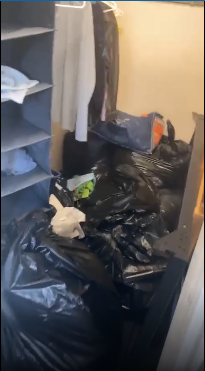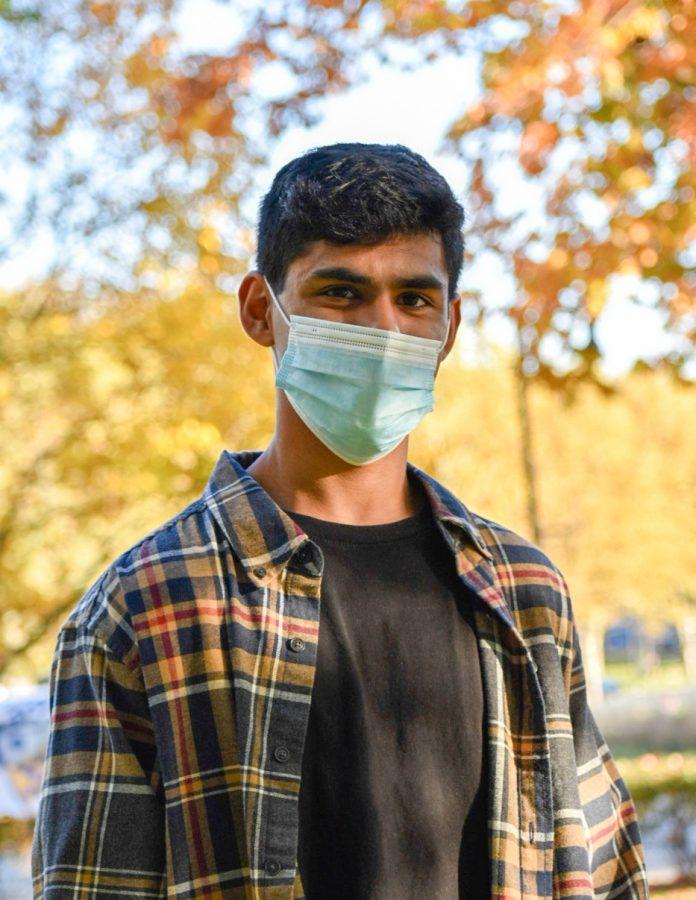‘So much that went wrong’: First student diagnosed with COVID-19 describes broken belongings, little University support
Pamela Smith | Staff Photographer
Sudeep Yedulla is suspected to be the first student on campus to have contracted the coronavirus.
November 18, 2020
When Sudeep Yedulla exited UPMC Presbyterian with a COVID-19 diagnosis in March, he said Pitt forced him to trek alone and in the dark to an isolation housing unit in the Fraternity complex. Dizzy from coronavirus symptoms and a lack of food, Yedulla said it was difficult to even walk up the steps at the Petersen Events Center.
“I had just gone into the hospital because I was struggling to breathe, and then they made me walk from the hospital up Cardiac Hill all the way to Frat House 9 on my own,” Yedulla, now a sophomore computational biology major, said. “It was really strange.”
Yedulla was the first Pitt student who lived in a residence hall to test positive for COVID-19, but his case didn’t end after he recovered from the coronavirus. He’s now battling Pitt for reimbursement for the cost of some of his residence hall possessions. The University has recently begun responding to his emails and contacting Yedulla about a refund for some of his items — after Yedulla contacted The Pitt News about his dilemma.
Yedulla’s positive COVID-19 test arrived several days after the University announced it would shift to online classes for the remainder of the spring semester, as the COVID-19 pandemic initially spread across the country. He returned to campus on March 13 from a vacation to Spain over spring break, and decided to self-quarantine in his dorm room as a precautionary measure to protect his family members at home. After getting swabbed on March 19 at UPMC Shadyside, he received news of a positive test result on March 22.
Kenyon Bonner, the vice provost and dean of students, confirmed at the time that the student who tested positive lived in Holland Hall, but Pitt didn’t release Yedulla’s name. Bonner said the affected student was “safely quarantined” at their permanent home off campus in a March 23 email. He also added that Yedulla’s close contacts had been notified, even though Yedulla said the University never asked him to list who he had seen or spoken to since arriving stateside from Spain.
Yedulla said as soon as he tested positive, the University revoked access to his Holland Hall dorm room and told him he would instead self-isolate in Frat House 9, on upper campus, until a family member could pick him up. Yedulla said he intended to quarantine for 14 days on campus in the Fraternity Complex to protect his parents. But because of what he described as a lack of essentials provided by Pitt, such as food, Yedulla’s parents decided to bring him home after just one night, on March 23.
“Even if I was positive, I was planning on quarantining in my dorm,” Yedulla said. “I obviously didn’t want to go back to my parents and risk them getting it, so I was just planning on isolating until the symptoms went away.”
When told of Yedulla’s account of his diagnosis and its aftermath, Pitt spokesperson Kevin Zwick said he couldn’t address any of Yedulla’s specific claims. This included Yedulla’s account of damaged belongings, no method for Yedulla to pick up his personal items from his residence hall and a lack of response from the University after Yedulla contacted various officials.
Zwick said Pitt has been in touch with Yedulla since the spring and is working to address his concerns. He added that multiple parts of the University, including housing, Student Affairs and Student Health, have worked since the beginning of the pandemic to provide support to students who needed to isolate or quarantine because of COVID-19 infection or exposure.
Yedulla said when he reached Frat House 9 at 11 p.m. on March 22, he hadn’t eaten for two days because of coronavirus symptoms and the extensive time he spent in the hospital. He reached out to his University-provided caseworker to get food, but she said it was too late at night to get him a meal and was already on her way home.
“I spent 48 hours without eating anything, and I asked the social worker the night I got into the room if I could just have a sandwich,” Yedulla said. “But she was on her way home and said she wouldn’t be able to do that.”
Zwick claimed the University followed its pandemic preparedness plan, adopted in 2007, and that every student was provided with food and medical support.
“We ensured that the handful of students who needed to isolate in campus housing during the spring term were provided with rooms stocked with snacks and beverages, provided with regular meals and checked in on regularly by medical staff,” Zwick said.
When told about Zwick’s response to his lack of food, Yedulla said he was stunned.
“The University did not do that,” Yedulla said. “It’s really easy to come out and say something like that, but when you look at all the receipts, I think they know they didn’t do that either.”
Yedulla said he also wasn’t provided with any blankets or bedding, even after asking the caseworker.
“Frat House 9 wasn’t the best place to stay at — they didn’t even have blankets, I had to use towels for blankets,” Yedulla said. “The bed was up, and there were no bedsheets or anything.”
Yedulla isn’t the only student who has detailed concerns about Pitt’s isolation and quarantine housing. Multiple students who stayed in quarantine housing in September described confusing directions from various University officials and lax rules in the housing.
During his stay in the Fraternity Complex, Yedulla texted his friend Madelyn Gilmore, a sophomore political science and public and professional writing double major. Gilmore said she remembers receiving a Snapchat picture from Yedulla of Pitt’s standard blue mattress found in student housing with no bedding on it.
“They didn’t give him any food, they didn’t give him any bedding,” Gilmore said. “He sent me a picture of this empty room like, ‘This is all I got.’”
Yedulla said even though he recovered from the coronavirus after a few weeks, Pitt’s interactions with him — even seven months later — has been “one of the worst times of [his] life.”
After notifying Steve Anderson, an associate dean of students and director of the Office of Residence Life, that his brother could pick him up from the Fraternity Complex on March 23, Yedulla said Anderson told him on a call that he couldn’t return to his Holland Hall dorm room. Yedulla and his brother could not retrieve any of his belongings, including his laptop or passport.
“[Anderson] called me and told me that I was not allowed back in Holland,” Yedulla said. “They turned off access to my card, as well.”
Yedulla added that he was concerned he wouldn’t be able to start his online spring classes on time, so he reached out to Bonner, Anderson’s boss, about collecting his laptop and class notes.
Bonner said in a March 22 email to Yedulla that no one was allowed to enter Yedulla’s dorm room for a “few days” because of public health guidance. But in the email, Bonner reassured Yedulla that Pitt staff would go to his room and collect his laptop and notes once it was safe to do so. They would then ship the laptop and notes to Yedulla’s home overnight so he could begin attending classes and completing assignments to continue his spring semester courses.
“After it is safe to enter your room … we will overnight ship your laptop and class notes to your home address,” Bonner said. “I hope you understand why this is important even though it is disruptive to your studies.”
Bonner said in a follow-up email a few hours later on March 22 that there is “a lot of room for improvement,” and that Pitt “revised” its processes to ensure that Frat House 9 “has all of the appropriate amenities and students receive good instructions on where to obtain additional items for their room, including food and extra linen.” He added that Pitt was “discussing a safe and responsible way to transport ill students who are unable to walk” to Frat House 9.
“I am sorry that last night’s experience increased your stress, but I appreciate your candid feedback,” Bonner said.
Yedulla said he eventually received his laptop in the mail, but the keyboard was broken and it was not functional. He said he called Anderson right after receiving his now-broken laptop to inform him about what happened. Yedulla later informed Bonner in a March 31 email that the laptop was not usable.
“They sent me my laptop, but they didn’t put any bubble wrap around it, and the keyboard broke,” Yedulla said. “I immediately [called] [Anderson] and [told] him I can’t do anything with it. He expected me to talk to [UPS] about it while I’m trying to do my online classes. It was not a smooth experience.”
Bonner said in an April 1 email that he would ask Anderson to file a claim with UPS. He also offered to loan Yedulla a Chromebook or reimburse him for the keyboard’s repair costs.
“I am sorry to hear about your laptop. It sounds like something happened during the shipping process,” Bonner said. “If you are interested in a loaner laptop, please let me know.”
Anderson sent Yedulla information the same day about how to file a claim with UPS. Yedulla said after reaching out to UPS, there was more paperwork that Pitt had to fill out before any reimbursements could be made. Yedulla said he got so frustrated he ended up purchasing another laptop for his classes, but he reached out to the University about the reimbursement again in late June. But Yedulla said Anderson “ghosted” him and didn’t follow up with him after July 17 via text message or email.
After not hearing from the University since July 17, a representative from Panther Central contacted Yedulla about a $1,012.22 reimbursement for his laptop on Nov. 6 after The Pitt News requested comment from the University about Yedulla’s case.
Yedulla was ultimately able to pick up his passport, clothing and other items from his Holland dorm room on June 22, although Yedulla said he found the timetable Anderson laid out confusing.
“[Anderson] said that I would be able to pick up my stuff as soon as dorms were reopened,” Yedulla said. “They said maybe it would be in April, and then May and finally in the middle of June, I was able to go pick up my stuff.”
But Yedulla said his dorm room didn’t look like he expected when he picked up his belongings. Yedulla said he was surprised to enter and find everything packed into trash bags, which were stacked in the closet.

(Video screenshot courtesy of Sudeep Yedulla)
“I found my passport in a box of cereal. The pages were wet, and it was soggy and ruined,” Yedulla said. “My headphones, I don’t know where they are anymore. Most of my clothes had food in them because there was food in my room when I left, which they didn’t bother to separate.”
Yedulla said he thinks the damages and loss of items cost him about $6,000. In the hopes that he would start receiving answers from the University to his emails and texts, Yedulla said he reached out to The Pitt News as a last resort.
After The Pitt News reached out to the University for comment, Pitt reached out to Yedulla on Nov. 9 and asked for an itemized receipt of damaged or lost items. Yedulla said this was inconvenient to do since it had been more than six months since he had last seen these items.
According to a Nov. 10 email from Pitt to Yedulla, less than half of the charges Yedulla requested will be reimbursed because Pitt said he doesn’t have all of the receipts for the items that were in his dorm room.
“For example, my headphones [that were lost] were purchased during the school year. The receipt was in my dorm room, so it was lost among all the trash,” Yedulla said. “I wasn’t thinking about looking for the receipts while sifting through the trash, and now they’re expecting me to provide the receipts in order to give money back.”
Yedulla said he thinks the estimate he sent to Pitt was fair because he couldn’t even remember everything that was lost in his dorm room.
“I think I was fairly lenient, to be completely honest, granted how they treated me throughout the entire process,” Yedulla said.
Yedulla said he will definitely dispute the reimbursement value because it is too low. He said the whole situation has been “extremely disappointing.”
“There was just so much that went wrong,” Yedulla said. “Everything that could have gone wrong, went wrong.”
While Yedulla was eventually able to pick up some of his items, some Panther Hall residents’ belongings were “inadvertently” discarded and couldn’t be recovered in late March. The belongings were discarded when Pitt was cleaning several buildings in preparation of housing Pittsburgh’s medical community during the COVID-19 pandemic, and was unrelated to whether or not a student tested positive for COVID-19.
Gilmore said she felt bad for Yedulla, because she felt he wasn’t properly taken care of by the University.
“It was really stressful because he was diagnosed right in the beginning when we didn’t know anything about COVID-19, and we were seeing Italy, China and Spain shut down entirely,” Gilmore said. “Other than that, we were just hoping he had the resources he needed, which I don’t really think he did.”
Yedulla said he’s disappointed that it took getting a third party involved to elicit a response from Pitt.
“If I’m being completely honest, I don’t think the University had any intention of coming back to me if The Pitt News hadn’t told them about the story,” Yedulla said. “It’s a little sad to see that after a student reached out several times with no reply, the only time they talk to the student is when the news is going to talk about it.”









